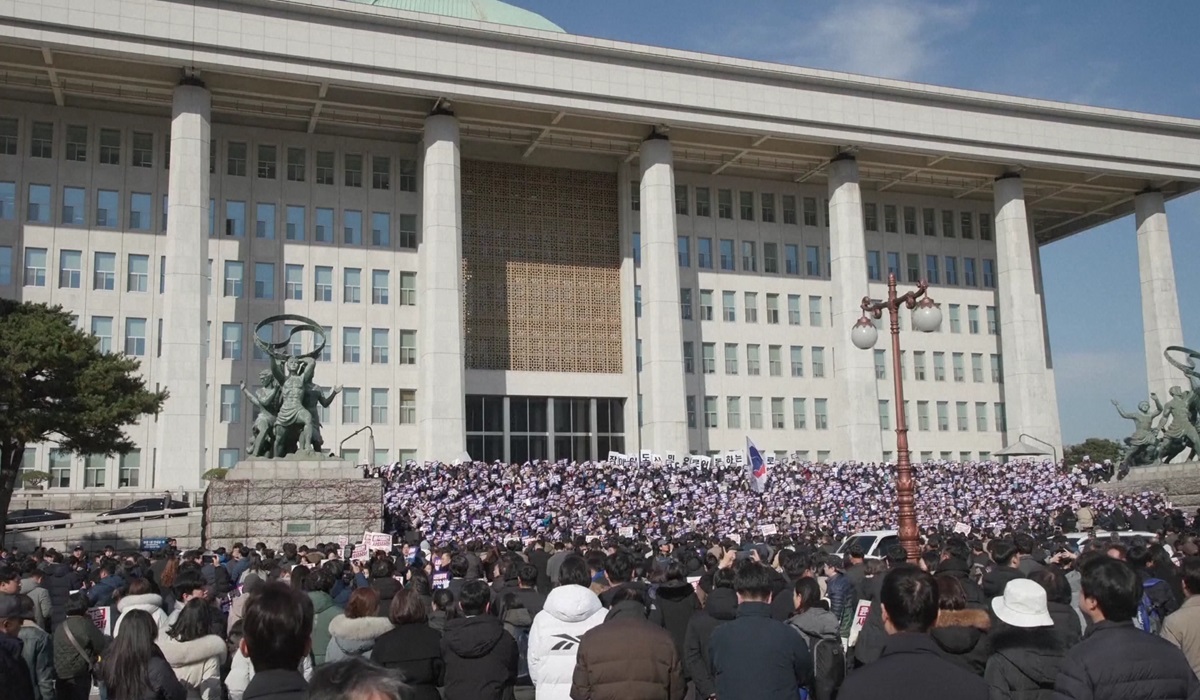Trump’s Birthright Citizenship Ban: Legal Challenges and Political Fallout
- TDS News
- Breaking News
- December 23, 2024

Image Credit, Rafael Oseguera
The rumblings from within the incoming administration of President Donald Trump are growing louder as the president-elect threatens to end birthright citizenship—a policy that has been an integral part of U.S. law for over a century. Despite being protected under the 14th Amendment, Trump’s team insists that an executive order could be issued to dismantle this longstanding tradition. The proposal suggests that the U.S. could refuse to issue passports to children born on American soil to undocumented parents, a move that would not only challenge the Constitution but ignite a firestorm of legal and political battles across the country.
Birthright citizenship is the principle that anyone born on U.S. soil automatically acquires American citizenship, regardless of the immigration status of their parents. This right is guaranteed by the 14th Amendment to the U.S. Constitution, specifically its Citizenship Clause, which reads, “All persons born or naturalized in the United States, and subject to the jurisdiction thereof, are citizens of the United States and of the State wherein they reside.” It was ratified in 1868 to ensure that newly freed African Americans were granted citizenship after the Civil War but has since extended to all individuals born in the U.S.
Trump’s proposed executive order to end birthright citizenship raises significant legal concerns. Critics argue that such a change cannot be made through presidential action alone, as the 14th Amendment provides clear protection. Altering the nation’s foundational laws requires a far more rigorous process—an amendment. This would need either a two-thirds majority in both houses of Congress or a constitutional convention called by two-thirds of state legislatures. Once passed, it must then be ratified by three-fourths of the state legislatures.
Given the difficulty of this process, Trump’s team may find it nearly impossible to enact this policy without a significant political fight. Legal challenges to such an order would likely emerge, and the issue would probably end up in the U.S. Supreme Court. The process of fighting such a drastic change to immigration policy would likely cost hundreds of millions of dollars in legal fees, with lengthy court battles spanning years.
This proposal is not just about legal battles—it’s also about the broader issue of immigration, especially along the U.S.-Mexico border. The Trump administration’s stance on illegal immigration has already drawn criticism for its harsh policies, particularly toward asylum seekers. The idea of ending birthright citizenship fits into a larger narrative about the need to curb illegal immigration, which Trump and many Republicans argue is an escalating crisis. However, this view ignores the underlying causes of migration from Latin America, where violence, poverty, and drug cartels drive many individuals and families to flee their home countries.
Much of the migration from countries like Mexico, Guatemala, and Colombia is directly tied to the ongoing drug trade, which is largely fueled by the United States’ demand for illegal drugs, including cocaine, marijuana, and fentanyl. The U.S. is a major consumer of these drugs, and the cartels that traffic them in Latin America create environments of fear, lawlessness, and violence, pushing many to seek refuge in the United States. For these migrants, coming to America is not a chance at prosperity—it is an escape from life-threatening violence and extreme poverty. Yet, once in the U.S., many find themselves trapped in a system that offers them limited rights and few opportunities for advancement.
Even though U.S. law grants asylum to individuals fleeing persecution, the Trump administration’s approach has been to limit their rights and to subject many to harsh detention conditions. The infamous “cages” used to hold children in migrant detention centers were a haunting reminder of the Trump-era policies on immigration, even though these facilities were initially set up during the Obama administration. The reality for many undocumented migrants is grim—caught between the need to survive and a legal system that provides them with minimal rights.
If Trump successfully ends birthright citizenship, the consequences could be profound. It would strip an entire generation of children—born in the United States—of their citizenship and rights, potentially leading to mass legal uncertainty for millions of people. Not only would it harm families, but it would also fuel division and mistrust in the government. Instead of addressing the root causes of illegal immigration, it would serve as a symbolic, and likely ineffective, response that avoids real solutions.
The Trump administration’s focus on limiting immigration while ignoring the broader issues contributing to migration—from U.S. drug consumption to the destabilization of Latin American countries—would ultimately fail to address the systemic nature of the crisis. If anything, it would deepen the wounds already inflicted by years of neglect and misguided policies. For a lasting solution, the United States must take a hard look at its role in creating the conditions that drive people to seek refuge on its soil and work toward comprehensive immigration reform that addresses both humanitarian needs and national security concerns.
At the end of the day, the proposal to end birthright citizenship represents more than just a legal or political challenge. It is a stark reminder that, until the U.S. addresses the root causes of migration and reforms its approach to immigration, these battles will continue. The legal costs alone will be staggering, but the moral costs—of abandoning the very principles upon which the nation was founded—could be far higher.








